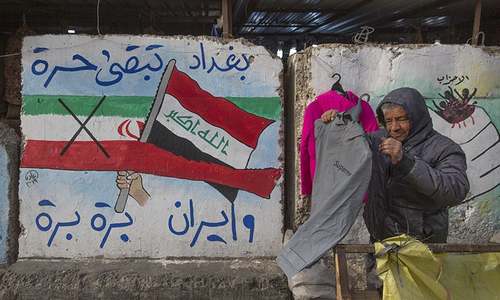DUBAI: Iran spurned the US president’s call for a new nuclear pact and its commanders threatened more attacks, after both sides backed off from intensified conflict following the US killing of Iranian general Qassem Soleimani and Tehran’s retaliatory missile strikes.
Concern that the Middle East was primed for a wider war eased after President Donald Trump refrained from ordering more military action on Wednesday and Iran’s foreign minister said missile strikes had “concluded” Tehran’s response.
But each side’s next move in their protracted shadow war was uncertain, although Iranian generals resumed their habitual barrage of warnings to Washington.
Trump’s Democratic critics have accused him of recklessness in his handling of Iran.
But analysts say that in an election year, he wants to avoid getting into a drawn-out conflict. In turn, Iran will try to avert direct confrontation with superior US forces, but can call on proxy militias across the region as sanctions bite.
Iran fired missiles at bases in Iraq where US troops were stationed in retaliation for the killing in a US drone attack of powerful general Qassem Soleimani in Baghdad on Jan 3.
The actions followed months of tension that has increased steadily since Trump pulled the United States out of Iran’s nuclear pact with world powers in 2018 and reimposed sanctions that have driven down Tehran’s oil exports and hammered its economy.
Trump told Americans in an address on Wednesday: “The fact that we have this great military and equipment, however, does not mean we have to use it. We do not want to use it.”
The Iranian missiles fired on military bases in Iraq had not harmed any US troops, he said. Iran “appears to be standing down, which is a good thing for all parties concerned”, he said.
‘Economic terrorism’
Trump also said it was time for world powers to replace the 2015 nuclear accord with a new deal that would allow Iran to “thrive and prosper”.
But Trump, who was impeached last month, also said he would impose more stringent sanctions on Iran.
Tehran’s UN ambassador Majid Takht Ravanchi said in response that “we cannot trust any idea of dialogue” when Trump was threatening to intensify the “economic terrorism” of sanctions.
Iran’s powerful Revolutionary Guards also issued fresh threats to Washington, with one commander warning of “harsher revenge soon” and another saying Wednesday’s missile strikes were only the start of a series of attacks across the region.
The new head of the Quds Force, which handles Iran’s foreign military operations, said he would follow the course pursued by his slain predecessor.
“We will continue in this luminous path with power,” Brig Gen Esmail Ghaani said.
Gen Soleimani carved out a sphere of Iranian influence running through Syria, Lebanon, Iraq and Yemen, challenging Saudi Arabia as well as the United States and Israel.
Soleimani was a national hero whose funeral drew vast crowds of mourners. The West saw him as a dangerous and ruthless enemy.
The military comments contrasted with Wednesday’s remarks by Iranian Foreign Minister Javad Zarif, who said Tehran did not want an escalation.
Despite tough talk, analysts said Tehran would not seek a conventional war with Washington, although it might turn to allied forces in the area.
“I’m not expecting further direct attacks from Iran. We are likely to see more indirect responses through proxies,” said Ali Alfoneh, senior fellow at the Arab Gulf States Institute in Washington.
He said there might be a chance for a negotiated solution to the latest standoff as “the Trump administration does not appear to actively pursue a war and Iran needs sanctions relief”.
Trump has often criticised his predecessors for involving the United States in long and costly foreign wars.
Patience
Washington said it had indications Tehran was telling its allies to refrain from action against US troops.
Vice President Mike Pence, speaking on Fox News, said: “We continue to receive word that Iran is standing down, but at the president’s direction we’re going to remain vigilant.”
In Iraq, Shia groups opposed to the US presence there also sought to cool emotions that have been running high for weeks.
Moqtada al Sadr, an influential cleric opposed to US and Iranian interference in Iraq, said the crisis was over and called on “Iraqi factions to be deliberate, patient, and not to start military actions”.
Kataib Hezbollah, an Iran-backed militia the United States blamed for an attack in Iraq last month that killed a US contractor, said “passions must be avoided to achieve the desired results” of expelling US forces.
European and US sources said they believed Iran had deliberately sought to avoid US military casualties in its missile strikes to prevent an escalation.
Iran said on Wednesday it respected Iraq’s territorial integrity after the missile strike led Baghdad to say it would summon Tehran’s ambassador.
In a letter to the United Nations Security Council and Secretary General Antonio Guterres, Iran’s ambassador to the UN, Majid Takht Ravanchi, said his country had full respect for “the independence, sovereignty, unity and territorial integrity of the Republic of Iraq”.
“The operation was precise and targeted military objectives, leaving no collateral damage to civilians and civilian assets in the area,” the diplomat said in a letter released by the Iranian mission.
Iran “recalls its dedication to the maintenance of international peace and security and stresses that it does not seek escalation or war,” he said.
Published in Dawn, January 10th, 2020














































